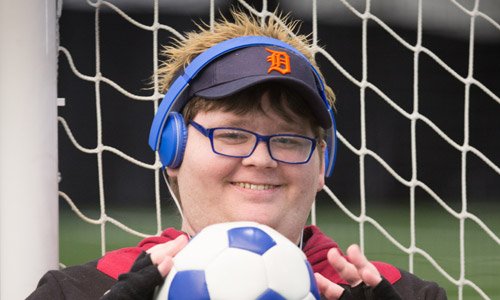Features

One of the nine preschool children from OU’s Applied Behavior Autism Analysis (ABA) Clinic in Pawley Hall.

The ABA Clinic opened on July 6, 2015, to the on- and off-campus communities.

Children receive one-on-one tutoring at the ABA Clinic.

Nine undergraduate behavior technicians from OU’s Psychology and Social Work departments each spend 15 hours a week at the ABA Clinic.

The ABA Clinic tailors treatment and care plans to the individual child’s needs.
Features
Winter 2016
| by Susan Thwing
STATE RENEWS $380,000 OU AUTISM GRANT
Project aims to meet autism training, research needs
When Claudia Leandres’ son was diagnosed with Autism Spectrum Disorder (ASD), her life dramatically changed.
“Your world just falls apart. I didn’t understand what it was, I didn’t understand what it meant, I didn’t know how to help him.”
After the initial shock, Leandres said she pulled herself together and decided to take action.
She turned to Oakland University for an education.
"I first went to OU because I knew they had expertise in autism, and the more I talked with them the more I knew I had to develop the tools to help my son,” she said.
Leandres recently graduated with a master’s degree in Special Education with a concentration in applied behavior analysis (ABA) – a program OU launched in 2015.
“There are 17,986 children with autism in Michigan, and as of January 2016, only 388 adult behavior analysts certified to help them,” she said. “That’s 46 to 1. I decided to become a behavior analyst to help my son and other children who need this kind of quality care.”
Her decision coincides with the Michigan Department of Health and Human Services University Autism Initiative to increase the number of ABA therapists, diagnostic and treatment centers, employment placement programs and ASD clinical trainings for primary care providers.
OU is one of six Michigan universities in the University Autism Initiative. Others include Central Michigan University, Michigan State University, Western Michigan University, Wayne State University and the University of Michigan – Dearborn.
For the third consecutive year, the health department renewed OU’s autism research and support grant, for $380,000. Jessica Korneder, Ph.D., BCBA-D, the grant’s principal investigator, said the University will address five areas with the state grant. These include increasing the number of:
- students seeking a master’s degree in ABA;
- board-certified assistant behavior analysts and
- registered behavior technicians;
as well as:
- expanding the number of children receiving ABA within the Medicaid system;
- and providing opportunities for individuals ages 16 and older with ASD to obtain paid employment.
The research and education will primarily be accomplished within the Applied Behavior Autism (ABA) Analysis Clinic on campus. The clinic opened on July 6, 2015, to both the on- and off-campus communities.
 |
| A renewed grant from the state helps train applied behavior analysis (ABA) therapists within the ABA Clinic setting. |
“Each child is different, so it is not an across-the-board treatment or care plan,” Dr. Korneder said. “As behavior analysts, we are data-driven, and the data shows that our children are making progress. But it needs to be tailored to the individual’s needs.
“That is what the continued research will do.”
For OU undergraduate and graduate students and the preschool children, the ABA Clinic represents a full learning cycle where “everyone wins,” Dr. Korneder said.
Nine undergraduate behavior technicians from OU’s Psychology and Social Work departments each spend 15 hours a week providing one-on-one tutoring to nine preschool students. In addition, “our four graduate students from the master's program in Special Education are learning to design and modify curriculum for preschoolers diagnosed with ASD.
Master’s-level student Beth Pollatz said the hands-on experience is making her a better teacher.
“When I went into Special Education, specifically to teach students with ASD, I knew the principles behind ABA, but had not really seen them put into action,” she said. “I wanted to improve my instruction and be better able to tackle the difficult behaviors that are often seen among children with autism and other developmental behaviors.”
I always look for ways to improve how I work with my students to better their lives. ABA has been the pivotal skill that I needed to do this,” Pollatz continued. “ABA has given me more insight into the behaviors and ways to develop behavior plans that work.
“I am grateful for this experience.”
For Leandres, it has been a win-win as a parent and as a student.
“The ABA Clinic and OU master’s program are wonderful. There are two-way mirrors and cameras that allow the parent to become a part of the therapy without being a distraction. In addition, graduate students are able to conduct research in the clinic and contribute to the field.
I simply don’t know where I’d be if I hadn’t turned to OU.”
Susan Thwing is a freelance writer from Rochester Hills, Michigan.
Jessica Korneder, Ph.D., BCBA-D
Director, ABA Clinic
Assistant Professor, Human Development and Child Studies
Dr. Korneder directs the University’s ABA Clinic and is principal investigator for the $380,000 grant from the Michigan Department of Health and Human Services (MDHHS) as part of a statewide effort to better treat and understand Autism Spectrum Disorder (ASD).
Her research interests center on teaching play skills, reducing stereotypic behavior (e.g., repetitive non-contextual behaviors) and parent training.
Prior to joining the OU faculty in 2014, Dr. Korneder worked as a director at two in-home behavior therapy companies. She has supervised and trained dozens of M.A. students working toward BCBA certificates and has assessed and designed curricula for hundreds of children with special needs.
Dr. Korneder has provided dozens of trainings and professional presentations in behavior analysis domestically and abroad for parents, undergraduates, and graduate students. She has taught research methods, basic principles of behavior analysis, developmental disabilities and application of behavior principles.
Dr. Korneder earned doctoral and master’s degrees in behavior analysis and a bachelor’s degree in psychology from Western Michigan University. She became a Board-Certified Behavior Analyst (BCBA) in 2001.
Presentations at National/International Conferences
Korneder, J.A., & Enloe, K.A. (2015, September). A review of stereotypy interventions: What works? Paper presented at 8th International Conference Association for Behavior Analysis International, Kyoto, Japan. Abstract
Korneder, J.A., & Malott, R.W. (2014, May). The use of response interruption redirection, time-out, and differential reinforcement to decrease stereotypy. Paper presented at the 40th Annual Convention Association for Behavior Analysis International, Chicago, IL. Abstract


